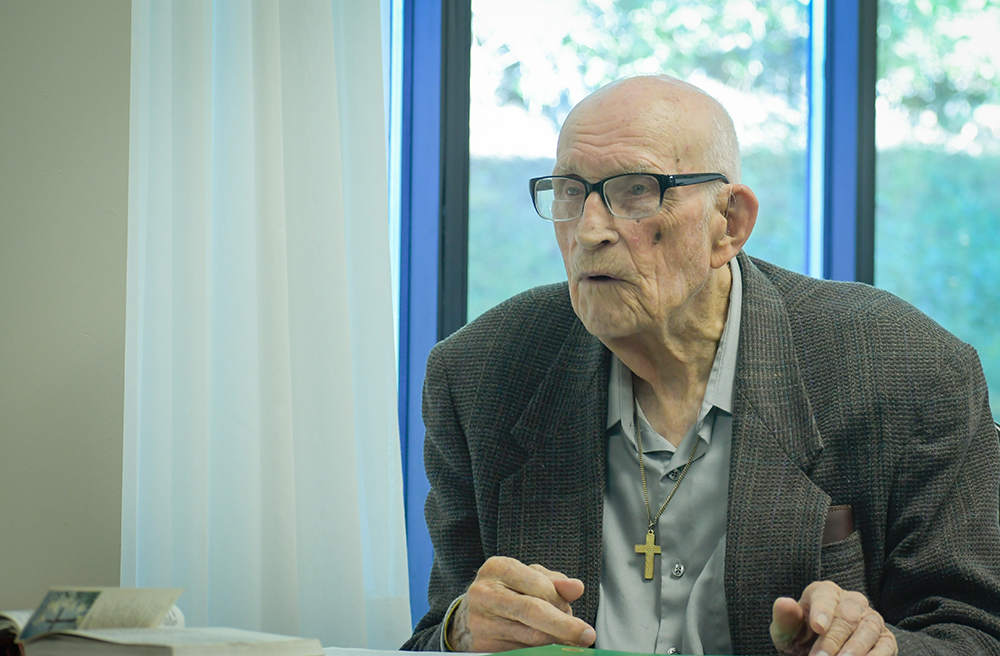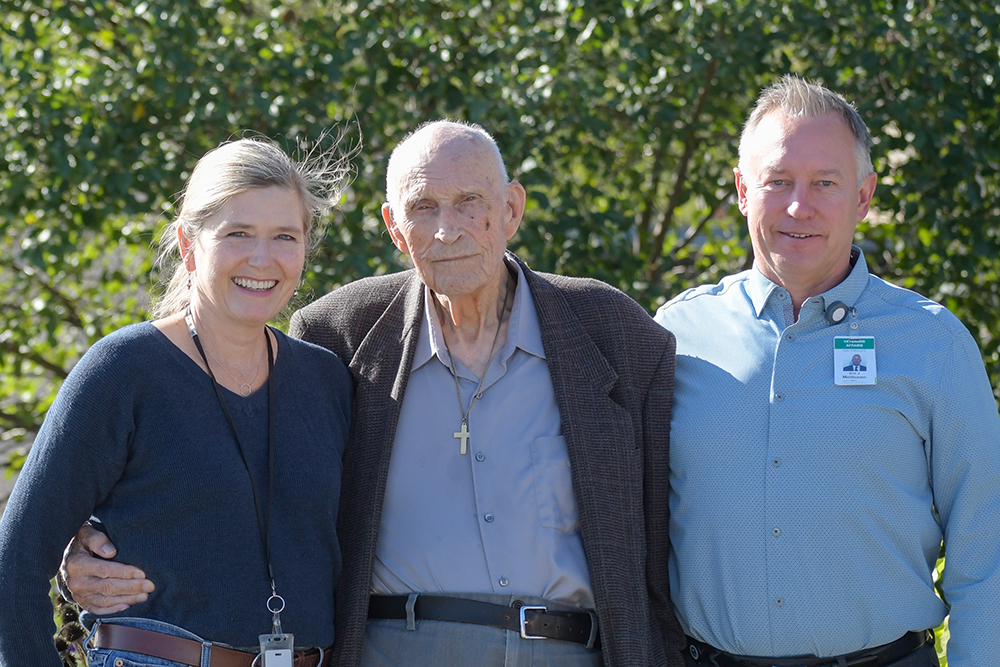11/15/2023 8:00:00 AM
 Russ Jorgenson, 99 – a Minneapolis Veterans Home Domiciliary program (DOMS) Resident – is the poster child for a life well lived. He was happily married for more than six decades to his sweetheart until her death several years ago. He drove his own automobile up until 2022. No matter what part of his life story you ask him about (in particular, his time in the military), his memory is crystal clear and his attention to detail is spot on.
Russ Jorgenson, 99 – a Minneapolis Veterans Home Domiciliary program (DOMS) Resident – is the poster child for a life well lived. He was happily married for more than six decades to his sweetheart until her death several years ago. He drove his own automobile up until 2022. No matter what part of his life story you ask him about (in particular, his time in the military), his memory is crystal clear and his attention to detail is spot on.
Everyone who knows him describes him as “sharp as a tack.” He still speaks and reads the Norwegian language he learned as a child. He tells stories with great energy and joy. He eats (healthily) to live, he doesn’t live to eat. He smiles and laughs at the drop of a hat. And he says his life has meaning because he has a purpose: serving God and his fellow Veterans.
Russ was born on May 23, 1924, in Jessie Lake, MN, which he describes as basically not a town, but a post office address. His family lived on a dairy farm. “Well, ‘farm’ is a loose description,” said Russ. “We only owned a few cows, so my dad had to support our family doing other work like block making and block laying.”
When Russ was 5 years old, his 2 and a half-year-old baby brother died unexpectedly during a flu epidemic. It shook the family to its core. Russ was old enough to remember the loss as well as the words of a 15-year-old neighbor that changed his life: “Don’t worry. He’s gone to heaven to live with Jesus.” Even as a small child, that message spoke to Russ’ heart, brought him comfort and directed every decision he made over the next almost 95 years.
Russ served his country during World War II, first in the Army Air Corps, then in the Air Force. He entered at age 18 as a private and went to gunnery school to be trained as a gunner on a B17 bomber, which was used to attack munitions plants/weapons facilities in Germany. The fatality rate for gunners was 50 percent. But Russ was willing to serve and potentially sacrifice as he was given a significant increase in pay for such a dangerous position. This was important to him as the timing was just on the heels of the Great Depression, where money had been tight for all. He was also promoted in rank to Sergeant. Over the course of his military service, he spent the most time in the Panama Canal Zone and the Philippines.
Russ survived two air crashes. During his first crash, all four engines quit and the plane hit the ground…hard. Russ stayed standing throughout the entire event. He walked away with a deep cut on his finger that required stitches. That was it.
Before his second crash, Russ had a feeling of foreboding as he got on board. After a loud noise, the propeller and tail fin broke off, one engine went dead and the plane flipped upside down. As the pilot went to make an emergency landing, Russ laid down and held onto a turret ring. The plane (and its flight crew) hit the ground going 200 miles/hour and bounced three to four times. When everything came to a halt, he climbed out a hole at the top of the plane. Amazingly, Russ heard the freeway nearby and hitchhiked a ride to the hospital. He was diagnosed with minor bumps, lumps, bruises and scratches. “Both times, I should have been seriously injured or died,” Russ recalled. “But the Lord saw fit for me to live.”
After the war ended, Russ got married and reenlisted in the service. He served an additional three years in the occupation of Germany.
Throughout his recoveries, Russ believed that God was reminding him that he had been kept alive to do something meaningful with his life. He began attending church regularly. As he prayed each day, the question he remembers hearing in his head was “What’s wrong with you? What more can you do?”
Following his time in the military, Russ had to make a tough career decision. He didn’t want to be a farmer like his dad but the general idea of making things with his own hands appealed to him. He wanted to create, not destroy, things. Construction was the field he selected; he began by earning a degree in drafting, then moved on later to owning his own construction company. His client relationships reflected the strong moral compass he had further developed in the military; he was well-known for his honesty, trustworthiness and reliability. However, at age 50, he decided he needed to do more to follow his faith’s call for service. He retired from the construction industry and pursued a career with the Child Evangelism Fellowship, serving on its board of directors and becoming its state director. After 20 years, the organization’s mandated retirement age of 70 meant Russ once again had to search for a way he could live each day with meaning. That search led to prison ministry.
Russ dedicated close to a decade to prison ministry work. Though he wasn’t formally trained as an educator, he taught and led Bible study with inmates for approximately 10 years. He shares that most of the inmates he met weren’t familiar with how to navigate the Bible, so each week he would hand print out the given scriptures for the day, then walk people through the lesson. Russ taught upwards of 50 men at a time who were committed to changing how they lived their lives. A few years after his prison ministry ended, Russ ran into a former inmate on the street who had been released and successfully turned his life around. He was moved that the inmate remembered a particular verse Russ shared every time they met for study group that seemed to make a positive difference. “It reminded me that prisoners are just people,” Russ said. “Not perfect, but willing to learn and do better. Like all of us.”
Russ learned about the Minneapolis Veterans Home Domiciliary (DOMS) program four years ago during a checkup at the VA Medical Center. Even though he was in his mid-90s and well settled into a routine, he felt it was the right time to make a change. His wife had died and his adult children were living out of state. “I believed it’s where the Lord wanted me to be,” Russ shared. “It was a great chance to reconnect with Veterans and my military history.”
He’s been leading a weekly Bible study group at the DOMS for three years. “Four or five Residents consistently attend,” Russ noted. “People are content to listen as I teach. Sometimes, they ask questions.” A big part of this ongoing interest may be the sense of fellowship that is offered by this program. “We have similar beliefs and similar interests; we feel connected to something bigger during these sessions.”
For Russ, there’s no sitting around in his room, watching TV or reading magazines. Instead, he gets up and out every day, dressing in his “business clothes.” Most of his days are dedicated to learning, sharing and spending time with fellow Veterans, but he enjoys the occasional game of blackjack or bingo, too.
As Russ thinks about his upcoming 100th birthday next May, he says he’s really proud of his ability to make lifelong friends. “Some of my strongest relationships resulted from an initial disagreement about something – usually questions of faith,” stated Russ. “Most all of my friends have been around most of my life.”
Family is very important to Russ. He speaks with his son, who lives in the Philippines, every day. One of his daughters lives in California, the other in Nevada. A surviving brother, 93, lives in Mora and a surviving sister, 80, lives in St. Francis. There is hope for a reunion in Minnesota next year.
Serving others, impacting people through teaching and staying engaged is what motivates Russ each day. “My number one priority in life is to be obedient to the Lord,” said Russ. “I’ve lived a good life; when He says it’s my time to go, I will without hesitation. But I hope I might have some more time left.” After his passing, Russ will be buried next to his wife at Fort Snelling National Cemetery.
 From left to right: Lori Ruble, Recreation Therapist, Minneapolis DOMS; Russ Jorgenson; Eric Meittunen, MDVA Deputy Commissioner - Veterans Healthcare
From left to right: Lori Ruble, Recreation Therapist, Minneapolis DOMS; Russ Jorgenson; Eric Meittunen, MDVA Deputy Commissioner - Veterans Healthcare